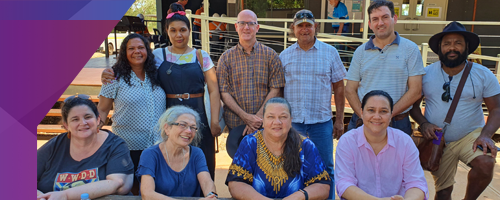The 2021–2023 evaluation of Queensland’s Community Justice Groups (CJGs), was delivered by Myuma Pty Ltd, an Aboriginal-owned social enterprise. The work undertaken over this three-year period is a significant contribution to Indigenous-led evaluation practice in Australia and deserves to be acknowledged for its excellence in both process and impact.
This evaluation represents one of the most comprehensive and community-responsive evaluations undertaken in the justice sector in recent years. Key strengths include:
- Indigenous-led by Myuma, with substantial leadership from Aboriginal and Torres Strait Islander evaluators, Elders, and respected persons. Creating a culturally safe, respectful, and relational approach throughout the design, fieldwork, and reporting phases.
- Deep community engagement: interviews and focus groups, and surveys reflect the scale and care of the engagement process. Community stories, voices, and aspirations were elevated as central sources of knowledge. The "Stories of Success" and community-based reporting approach provided a powerful narrative form of accountability, rooted in Indigenous knowledge and storytelling practices.
- Rather than relying on narrow, externally imposed metrics, the evaluation focused on what matters to communities—relationships, healing, empowerment, and safer futures.
These features embody best practice in Indigenous evaluation, aligned with principles of Indigenous data sovereignty, community control, cultural safety, and accountability to the community first and foremost. The evaluation not only captured outcomes—it created space for systemic reflection on where power, investment, and voice reside. Notable contributions include:
- Identifying CJGs as sovereign knowledge holders: The report affirms the unique authority of CJGs to guide culturally responsive justice responses, reinforcing their role as both service providers and cultural leaders.
- Resourcing equity: The evaluation powerfully demonstrated the value of CJGs in diverting individuals from custody, quantifying cost savings while humanising the broader community impacts. It advocates for core funding increases, localised capacity development, and sustainable investment models.
- Power-shifting recommendations: Critically, the report calls for the establishment of an Indigenous-controlled CJG peak body to lead capacity development and coordination. This is a major step toward shifting governance from government to community leadership.
- Whole-of-system critique: The evaluation highlighted service system gaps, colonial justice frameworks, and the undervaluing of CJG labour—especially when contributing to other agencies’ outcomes without commensurate support.
While this evaluation demonstrates outstanding Indigenous-led practice, some areas for continued development include:
- Formalising Indigenous data governance: Greater clarity on data ownership, access, and use rights by communities would reinforce long-term control and use of findings.
- Embedding community co-analysis: Future evaluations may benefit from explicitly co-developing findings and recommendations with CJGs and community members to deepen shared authorship.
- Pushing for structural reform: While the evaluation highlights power imbalances and systemic racism in the justice system, it could more forcefully position these within a decolonising framework.
This evaluation has made a deep and enduring contribution to the visibility, resourcing, and legitimacy of Community Justice Groups across Queensland. This nomination reflects the best of Indigenous evaluation, led by community, grounded in relationships, and oriented toward justice, healing, and transformation.
We commend the team for the care, courage, and clarity with which this work has been carried out, and we hope it sets a standard of excellence for future evaluations across government and community sectors.
About the Indigenous Evaluation Award
This Award recognises Indigenous evaluation practice. This includes evaluations led by Indigenous peoples, and/or conducted in partnership with Indigenous peoples. It also recognises evaluation capacity building with Indigenous peoples in Australia, New Zealand, Papua New Guinea, and Pacifica.
Work nominated for the Award should:
- generate positive impacts for the Indigenous communities
- nurture Indigenous self-determination and sustainability#
- empower Indigenous people in evaluation practice##
- strengthen the accountability of Indigenous evaluation.
Recipients of this Award agree to publish their evaluation products on the AES website.
# The underlying intent of this point is to encourage a conceptual shift in practice from doing evaluations on Indigenous peoples towards doing evaluations with, and/or by, Indigenous peoples. For further guidance on the meaning of Indigenous self-determination and sustainability in this context, please refer to the descriptions in the Australian Institute of Aboriginal and Torres Strait Islander Studies Code of Ethics for Aboriginal and Torres Strait Islander Research – Consultation Draft, 2019. Non-Indigenous and First Nations evaluators can refer to the AES (2021) First Nations Cultural Safety Framework for further guidance on principles and practices for moving towards culturally safe evaluations.
## Empowerment may include work in building evaluation capacity, building a culture of evaluation, and/or an awareness and interest in evaluation, and evaluation policy development. Nominations are assessed by a panel of Indigenous peers.

